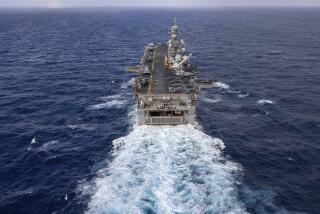Cutter Crew Prepared to Tackle Oil Spills
- Share via
ABOARD THE CUTTER WALNUT — Taking a lesson from the 1991 Persian Gulf War, when retreating Iraqi troops torched oil wells and dumped crude oil in their wake, the U.S. Coast Guard has assembled a small but specialized response team aboard this vessel to combat any fresh attempt at environmental terrorism.
From experts in oil-spill cleanup to a medic trained to treat smoke inhalation, crew members aboard this multipurpose cutter -- the only one deployed so far to the gulf -- are poised to react should Iraqi President Saddam Hussein seek to again wound Mother Nature.
The Walnut, based in Honolulu, carries 50 sailors and has more experience tending buoys and aiding distressed vessels than mopping up oil. The 4-year-old vessel has tested its spill-response equipment only in drills.
But on the theory that swift action would lessen the long-term ecological damage, the 225-foot cutter has come from the other side of the world to stand vigil against a deliberate spill.
“Past events show he is capable of doing this,” Chief Warrant Officer Paul Morgan of Reedsport, Ore., said last week of the Iraqi leader.
As defeated Iraqi forces abandoned occupied Kuwaiti territory at the end of the 1991 war, they set fire to oil-well platforms, sending a pall of black smoke across the region. They also dumped several million barrels of crude oil into the gulf. Although this time the Iraqis would be damaging their own resources, U.S. military strategists say they have to prepare even for self-destructive acts of desperation.
Lt. Cmdr. James Hanzalik of the Coast Guard’s National Strike Force Coordination Center in Elizabeth City, N.C., is one of 11 marine spill cleanup specialists deployed here to patrol the most vulnerable areas along the gulf’s northern coast.
Hanzalik concedes that the Walnut alone would be overwhelmed by a major spill but points out that other U.S. and allied vessels in the region, of which there are now hundreds, could be conscripted to help if a massive response was needed.
“We feel we have quite a bit of containment equipment, and we are also working with some of the gulf nations to be ready for this,” said Hanzalik, whose team includes technicians from all three stateside Coast Guard strike force operations, stationed on the coasts of the Atlantic, Pacific and Gulf of Mexico.
The cleanup gear comes modestly packaged. Four orange crates stowed in the cutter’s hold contain a 30-foot boom, floating pumps and inflatable barges, all controllable from the ship’s bridge.
The boom could sweep the water’s surface to pool oil around pumps capable of siphoning 150 gallons per minute.
The skimmed muck would then be piped through hoses running over the ship’s deck to an inflated barge, which can hold as much as 28,000 gallons. Should the barge become full, said commanding officer Lt. Cmdr. Chris Smith, it could be dispatched to a tanker to transfer its load and another barge could be inflated to take its place.
Any victims of smoke inhalation or exposure to oil-borne contaminants could be treated at the Walnut’s sick bay, said Petty Officer Charity Bruno, the ship’s medic.
The environmental response crew’s capabilities are limited to oil-spill hazards, she noted, adding that neither she nor her crew mates would have any means of mitigating a release of chemical, biological or nuclear agents by Iraq.
“If it’s something airborne or a spill of some hazardous substance into the water, the first thing is going to be to get out of the situation,” said Bruno, a native of Guam.
While there’s not much maritime forces can do to prevent environmental attacks, Walnut crew members say they are confident that allied ground units have contingency plans for keeping retreating enemy soldiers from pausing long enough at oil facilities to make any devastating departing gestures.
“We don’t know what he’s still capable of,” said Quartermaster 1st Class Ben Trautman of Miami. “We just have to practice and be prepared for the worst.”
More to Read
Sign up for Essential California
The most important California stories and recommendations in your inbox every morning.
You may occasionally receive promotional content from the Los Angeles Times.











